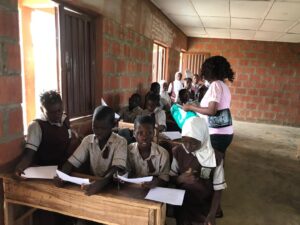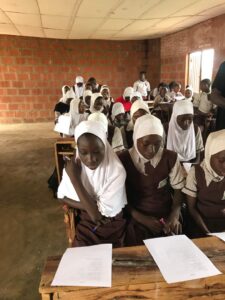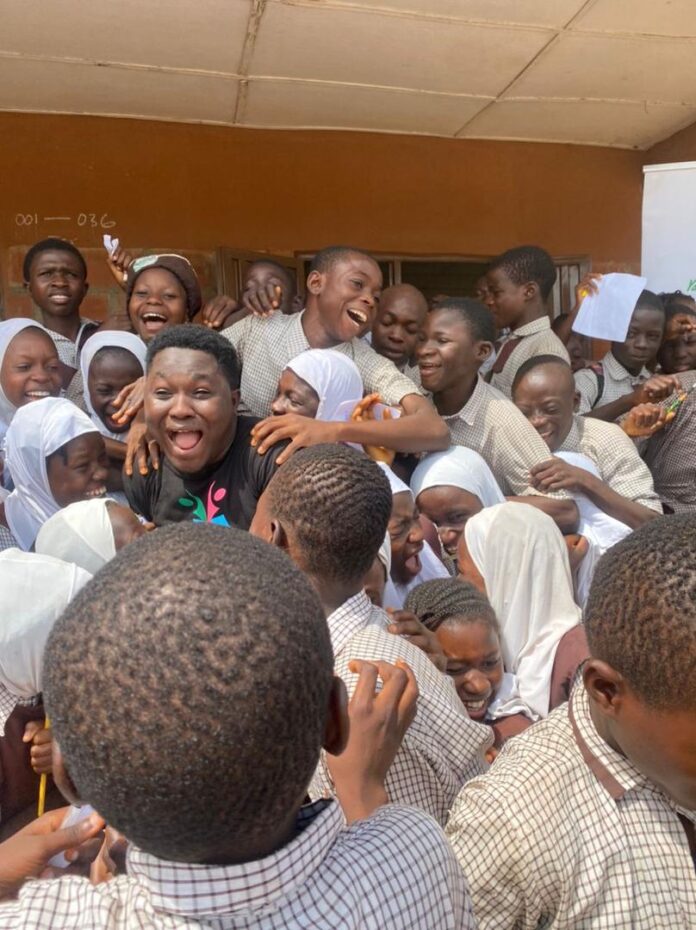Olayide Soaga
For weeks, 13-year-old Mistura Gold’s parents were distraught.
Their eldest son had just gained admission into the university. This was meant to be a moment of joy for them, but the reality of increasing school fees snatched their joy, replacing it with worry and despair. The couple had vowed to educate all three of their children up to the university level, yet that promise now seemed impossible to keep.
Each time they thought about how to keep Gold and her brothers in school, a cloud of anxiety settled over them. Their brows furrowed with worry, and the mood at home turned sour. They had explored different options, but only one appeared feasible at the time – sacrificing Gold’s tuition and paying her elder brother’s fees.

Gold was about to enter JS3 at the time. The school management sent her away from school. Her father would call the principal to plead with him to let her remain in school and promise to pay her fees.
One Child’s Story, 18 Million Others
Gold is blameless. Her parents are also not the villains in her story. The villains in her story are the socioeconomic woes befalling Nigeria and insecurity, which have made it difficult for parents like Gold’s to keep their children in school, thereby contributing to the country’s unenviable status as the country with the highest number of out-of-school children in the world.

According to the United Nations Children’s Fund (UNICEF), Nigeria has an estimated 18.95 million out-of-school children. The head of the UNICEF office in Kano, Rahama Farah, attributed the damning statistics to the numerous attacks on schools by jihadists and criminal gangs.
Insecurity has been a long-standing issue in Nigeria, but it became a major national crisis in the early 2000s, intensifying significantly from around 2009 onward. Since then, Nigeria has been experiencing various spates of attacks, which have worsened considerably in recent years, particularly in the northern region.
“These attacks have created a precarious learning environment, discouraging parents and guardians from sending their children to school,” Farah said in 2024.
Jihadist attacks are not the only forces shutting the doors of schools on Nigerian children. For children in other parts of the country where jihadist attacks are not rife, poverty keeps children away from schools. This was echoed by Nigeria’s Minister of Education, Tunji Alausa, in May.
“Despite our progress, we recognise the persistent challenge of out-of-school children, with numbers exceeding 14.8 million. Factors such as poverty, insecurity, and cultural barriers compound this issue,” the Minister of Education said.
In 2024, the World Bank revealed that over 129 million Nigerians live in poverty. For this population, poverty turns necessities such as food and education into luxuries.
Like Gold, 14-year-old Abiodun Praise was sent away from school when she was about to write her promotional exam to SS1. The 14-year-old comes from a family of six, and her parents are low-income earners. Her father works as a security guard in a bank, and her mother is a teacher.
“It was difficult for my parents to pay my school fees, and sometimes I was sent away from school while my mates were learning,” Praise said, as memories of her picking up her bag and leaving the classroom when she was sent away from school returned.

“I did not come to school until the fifth week of that term because there was no money. I felt really bad,” she continued.
While speaking on the severity of the issue, the Proprietor of Divine Excellence School in Ilorin, Elder Adama Gabriel, said the school has seen parents unable to pay their children’s school fees. Pupils enrolled in primary school pay the sum of N20,000 every term, while secondary students pay N40,000.
“Some children sit at home because their parents cannot pay their fees. Last term, four children dropped out because they could not pay school fees. The current school fees is subject to review because of what is going on in the country. We are thinking of reviewing it in September,” said Gabriel.
Flipping the Script
Abiodun and Gold were part of the 18.5 million out-of-school children, but an encounter with a youth-led initiative flipping the script on Nigeria’s out-of-school children dilemma reopened the doors of education that poverty had once shut.
The youth-led initiative, which is domiciled in Kwara, Yattiyr Scholarship Initiative, has been paying the tuition fees of indigent children like Gold and Abiodun since 2018. The initiative was borne out of personal experiences of John Fatoye, a medical doctor and co-founder of Yattiyr Scholarship Initiative, who is working to ensure that as many children as the initiative can help don’t experience what he went through as a child.
In 2009, Fatoye’s father, a civil servant, was relieved of his duties. This meant that he could no longer afford to pay Fatoye’s school fees conveniently as he used to. It was also challenging to provide food for the family. So, Fatoye and his siblings would go to bed on an empty stomach some days.
Fatoye described the period as a time when things turned upside down.
“Things turned upside down. Some of my siblings had to start working to make ends meet. I was getting sent out of school too many times. Despite being the best student in school and representing the school in competitions, my name would be on the board in the class,” Fatoye recounted.
“During exams, I would look up and see my name. It was saddening. It was a reminder that they could come pack us out of the class anytime as school fee defaulters.”
After representing his school in a competition in JS1, the news made rounds on TV and radio stations and newspapers. A good Samaritan heard the news and contacted Fatoye’s father to inform him that he would pay his tuition fees up to university level.
Fatoye’s experience served as a bedrock for the foundation of the initiative.
“It was in the middle of this journey that I started thinking about how to give back, and the idea of finding many children like myself whose dreams were being sacrificed on the altar of poverty came to mind. And I decided, by God’s grace, to launch an initiative that identifies children like this, pitches their stories to potential sponsors like I found, and gets them to school,” he said.
He did not begin the initiative when he got the idea because he was focused on medical school. The vision, however, returned when he was in his second year in medical school, when he met a 12-year-old girl of Hausa descent who worked as a maid in a restaurant.
Fatoye said he was impressed by her good command of the English language and asked her where she had been schooled. But she said she had never set foot in a classroom and only learnt how to speak well through her interactions with doctors, students, and educated people.
“The vision came back. I thought, if this kind of girl who has never been to school could pick up this much from her environment, how much more getting her into school, and how much more would she be able to achieve if she had access to quality education?”
She became the first beneficiary of the initiative. Alongside seven other friends, Fatoye established the initiative that has helped over 150 children remain in schools in seven years.
How It Works
The initiative adopts various means to get indigent children who will become beneficiaries. The monitoring and evaluation officer, Jesuseun Adebayo, said they visit schools and make enquiries with the management of schools about children struggling to remain in classrooms or walk up to random people to ask about their children.
The initiative raises funds for the children through local and international sponsors and grants.
“We have calls for beneficiaries when sessions are ending. Sometimes we get people seeking support for them. Sometimes we have our volunteers look for beneficiaries. Other times we could trek on the streets of Ilorin, see traders, and ask them questions about their children. Other times we have people tag us on social media,” said Adebayo.
After they are introduced to indigent children, the initiative conducts background checks on them to ensure they need a scholarship. Adebayo said they do this by visiting their schools and homes.
Thereafter, the beneficiaries are paired with mentors. According to Adebayo, the mentors are selected based on their availability and proximity to the indigent children. The mentors check up on the beneficiaries in school and their homes. Adebayo added that they have a strong relationship with the schools where the beneficiaries are.
Looking back from when the initiative started and the success stories it has recorded, Fatoye beams with joy and pride.
“I am particularly impressed by our achievement. For instance, when we started out in the first year, we told ourselves we wanted to get three children into school. But by the end of the first year, we had 28 children in school already,” he recounted.
Solving School Access While Battling Their Barriers
While finding a fix to Nigeria’s out-of-school problem, Yattiyr Scholarship Initiative experiences internal struggles. According to Fatoye, funding is a significant challenge to the initiative’s operations.
“With more funds, we can help more indigent children and set up branches in different states so as to reach out to more children across the country,” said Fatoye.
Another challenge the initiative faces is the level of expertise of its staff and the need for more hands. Fatoye said many of their volunteers are students and early-career professionals who may not have the advanced level of expertise required for the roles they are to perform.
“We need more people with advanced skills like grant writing, content creation, video editing, and other skills. Many of our volunteers are young people, and when they graduate, they go to serve and leave the state. That leaves us with a gap. Every now and then we have to fill these gaps,” he added.
These challenges are not stopping Fatoye and his team from aiming for the moon.
He hopes that five years from now, the initiative will have helped at least one thousand children remain in classrooms, expanded university scholarships across the country, created a website to promote the visibility of the initiative, and secured at least ten major grants that will keep more children in school.
The initiative’s success stories keep Fatoye’s dreams of keeping more children in school alive.
This story was published with support from the Scoop Storytelling Initiative under its Frontline Narrative Fellowship




